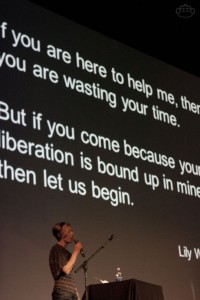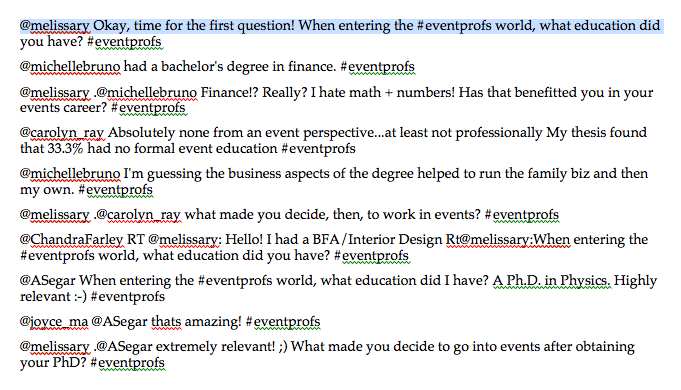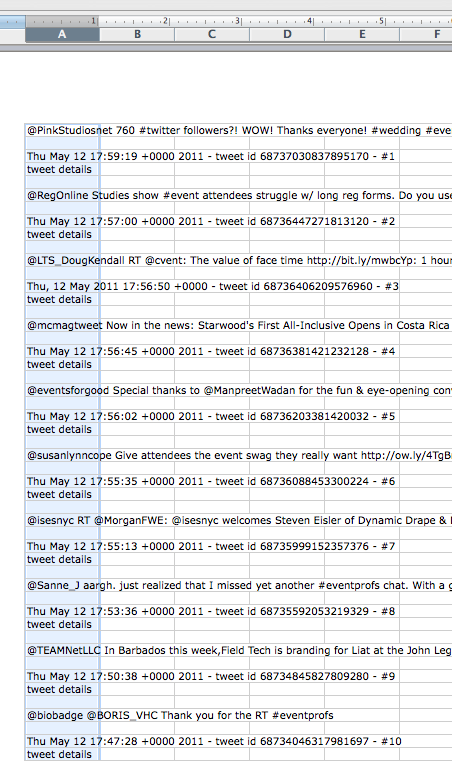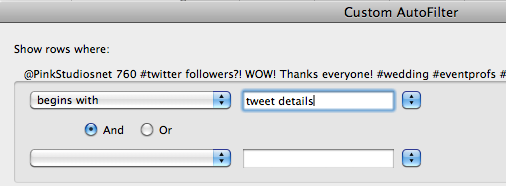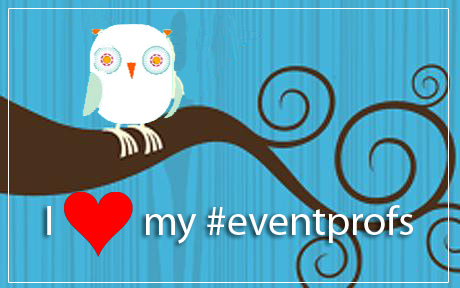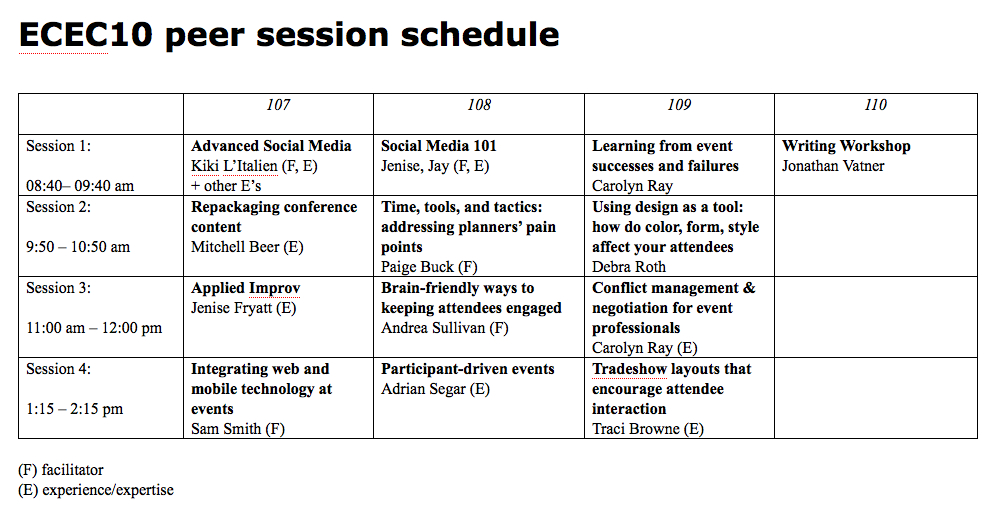Survey results on the future of #eventprofs chat
Earlier today I posted, via Twitter, a five question #eventprofs chat survey to gather opinions about the future of #eventprofs chats. Here it is:
I received 23 responses in the following 8 hours—thank you to everyone who took the time to respond! (And a big thank you to several respondents who offered to moderate a chat for the first time.)
The survey responses
| Responses to Q2 (changes => more likely) |
| 1x a week would make it easier for me. it was more about the consistency then the times. I used to have them in my schedule then took them out – inconsistent. it has been much better now. |
| I think it would be good to have some testimonials and do a bit of promotion around that. You know “great chat learned loads and all very useful” |
| I would rather see it as a once monthly event to look forward to where the whole community was online and more engaged |
| none |
| once a week during the day. |
| I would prefer a change to the hashtag so that there is less interference during the chat from other #eventprofs users. Reminders via email are helpful (thanks for today’s reminder). |
| timing is not as important as topic although day time chats are better for me. |
| Looking forward to that discussion this evening. (Sorry, still pondering.) |
| mid-weekly chats 8 or 9pm |
| I am on EST time. The chat on Tuesdays at night never works for me. I try not to work after I leave the office 🙂 I think lunch time is great on Thursdays. Two per week is a lot. I also think that having people from the community is a great way to promote the chats. Wish we could make the community a little more organized in a way. The wiki is ok but having a whole site dedicated to #eventprofs would be cool – chat schedule, topics, past topics, transcripts, list of members, list of moderators and frequency, twitter stats, maybe even syndicate the blog content or have a location that lists all resources everyone is sharing, meetups in your city, links to other sites, etc. Any way you can help the moderators and members promote themselves would get more people to engage and contribute I think. The #eventprofs hashtag is also used very widely know… maybe we should have a sepearte tag for the chats themselves. It would be cool to have an #eventprofs member badge! [Adrian: there is an eventprofs badge!] |
| I would like to attend on Mondays rather than Thursdays. With my kids 9PM on Tuesday is never doable and Thursday is always a busy day. It would be nice to start the week off with Eventprofs! |
| Would prefer chats on Friday & Monday instead of mid-week. More convenient times for Europe GMT+1 = end of the afternoon or early evening after 8 pm Less chats; one topic only. Other platform then twitter not to bother no event tweeps to much 🙂 More attendees also like to see more end-users/customers to get their insight |
| I believe 1 chat per week is appropriate…2 is too many. Plus there is a difference between a corporate event and a special event; a public event and a private event. Someone who plans education for associations does not have the same needs/problems/challenges as someone who plans an awards dinner. Yes, there is some overlap, but… So I believe extremely focused chats are the best solution with the specific audience listed in the promotion of the chat. IMO that is the best way to have successful, solution driven chats. |
| Once a week during the work day with existing format and a way to filter out sales promotions. |
| Evenings are tougher for me, maybe a bit earlier in the day would make it easier. |
| I think once a week would be sufficient. You can rotate between Thursday and Tuesday to hit people with different time zones, |
| It’s always hard for me, on the West Coast to attend the Thursday chats as they are during work hours. If we could have them at 5 pm Pacific or 8 pm EST, then it would be easier to attend. 6 pm is also a little tough as it is time I normally would be driving home. |
| I’m usually too busy during the day for the chats, and I’m usually off the computer before the evening chats. I might be able to join more with an early evening time. Timing doesn’t affect how I recommend them, though, as this is just my schedule. |
| Use of different technology occasionally along with twitter, (Google Hangouts, Skype, Webinar format, video, etc) |
| earlier times for late chat (due to time difference). format is good. maybe more chats with guests (ask a colleague), or chats about specific events and their challenges. change in hashtag for chats? |
| Responses to Q3 (changes => less likely) |
| i like when there are more questions – or more then one – also – they could be posted somewhere before the chat |
| I should be able to attend on a more regular basis. My problem is working out what time they are happening. A GMT note would be really useful for me |
| While evening chats are more convenient, I am often busy with personal plans and would rather not use that time as work |
| I’m on pacific time. Any chats that take place during the night aren’t good for me. |
| more chats, less chats |
| Again, topic more important but evening chats ET cut into personal time and that is tough to make each week. |
| Can’t think of any reason except that maybe if the chats decline in frequency so that you can’t always count on them, or if less people start showing up. I always recommend the chats to colleagues tho!! |
| Hosting the chat in the evening or in a different format: conference call, webcast or G+ hangout. Most of my colleagues are on Twitter and have yet to embrace G+ fully. |
| Content is more of a driver than the timing and format, etc. |
| No not at all. People are very busy having to put forth tons of time and effort for business development. Projects are being assigned with short windows for planning and execution so people have less time. |
| If they were always just during working hours. |
| Staying the same week in and week out. Let’s experiment and diversify as much as possible |
| pushing the time to later in the day or evening – that would make it impossible to join |
Summary of survey results
[Warning! Small sample! Apply caution before drawing conclusions!]
Frequency
Six people preferred reducing the frequency to one chat a week. Five people seemed to imply through their comments that the frequency be kept as is. The remainder did not mention changing the frequency, except for one person who suggested once a month.
Time of day
Five people preferred holding the chats during the day/working hours, while three preferred evenings. Not surprisingly, the three European respondents did not want 9pm EST chats.
Separate hashtag
Three people suggested having a separate hashtag for the chat.
Other suggestions
Promotion: do more, use testimonials, help promote moderators, better website.
Platform: use other platforms besides Twitter.
Content: more guests, post questions before chat, focused topics.
Conclusions
Keeping the small sample size in mind, I have to conclude that there wasn’t an obvious majority in favor of any specific change. That’s not to say we should keep things the way they are. If we tried out a once per week chat, I’d be in favor of rotating the day/time so that people who can’t make a specific date/time combination wouldn’t be completely locked out. I’d also love to improve the functionality/ease of use of the website as some suggested, though I’d need some help to make this a reality (offers welcome!) Finally, I’m still really undecided about changing the hashtag for the chat. Using a new hashtag might cut down promotional tweets (though I suspect they’d invade any new hashtag eventually) but would cut off exposure to the 2+ years development of the #eventprofs brand, such as it is.
Did you miss the survey, or this evening’s chat? Feel free to add your comments below!

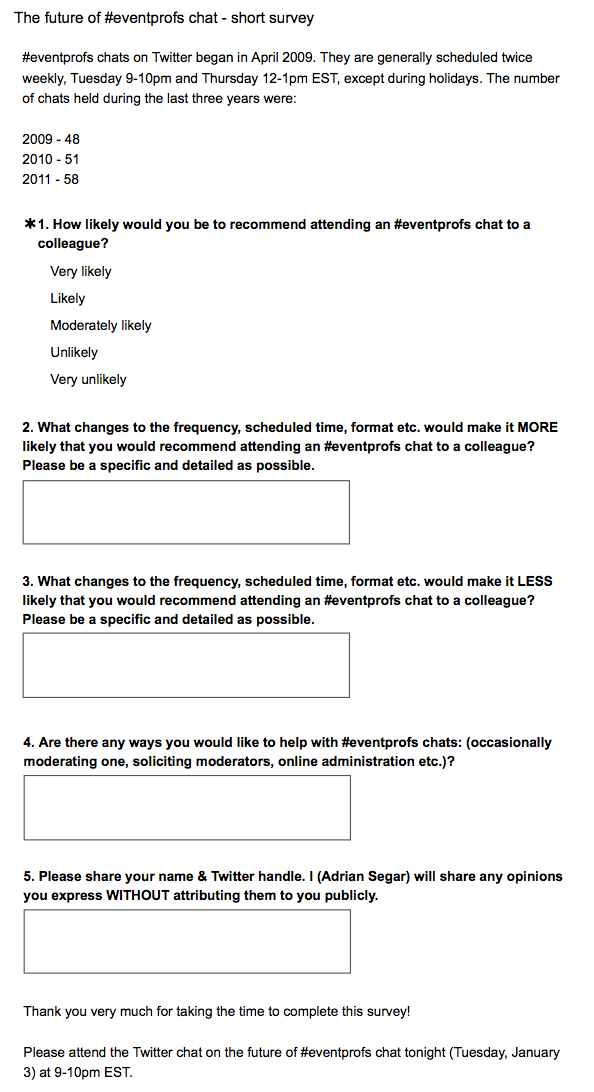
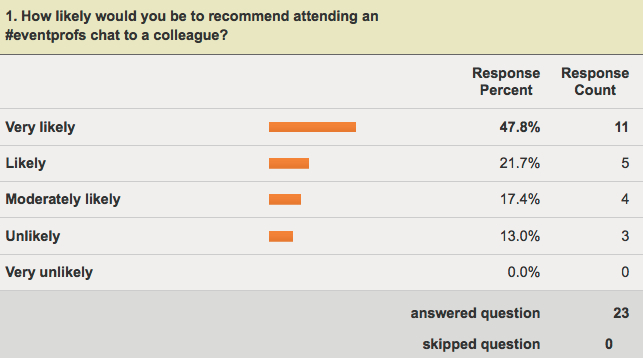
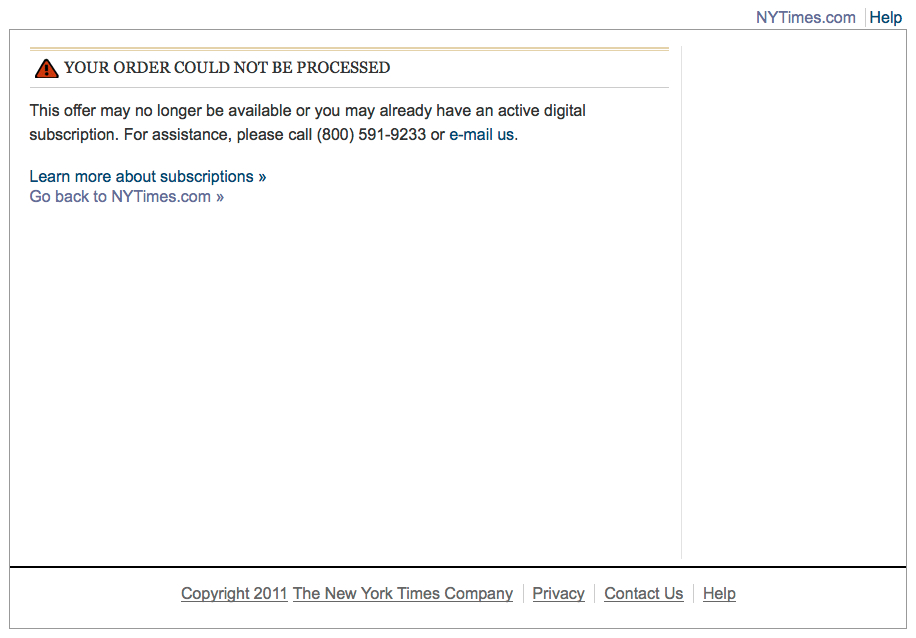
 Here’s a simple challenge to anyone who organizes an event and asks for evaluations.
Here’s a simple challenge to anyone who organizes an event and asks for evaluations. Traci Browne: A journey inside the mind of a conference producer.
Traci Browne: A journey inside the mind of a conference producer. Paul Cook
Paul Cook Jenise Fryatt: Build connections, gain business and personally grow by using the EIR social media strategy.
Jenise Fryatt: Build connections, gain business and personally grow by using the EIR social media strategy. Andrea Sullivan
Andrea Sullivan